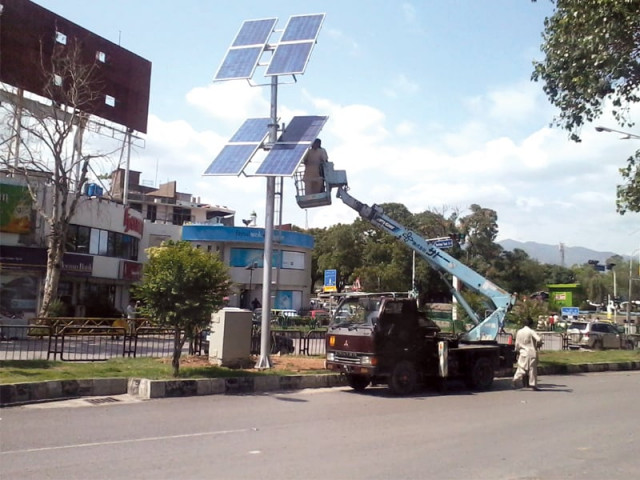Second attempt: CDA plans for solar-powered streetlights may be eclipsed
Permission for public-private partnerships needs president’s approval.

Under the plan, for which Rs20 million has already been allocated this year by the authority, the streetlights will be converted to run on solar power. PHOTO: WAQAS NAEEM/EXPRESS
They say the third time is a charm, but the Capital Development Authority (CDA) will be hoping the same applies for the second attempt. After its embarrassing failure to implement a graft-riddled light emitting diode (LED) streetlight project last year, the CDA has initiated work on a proposal to introduce energy-efficient streetlights in Islamabad.
Under the plan, for which Rs20 million has already been allocated this year by the authority, the streetlights will be converted to run on solar power. The CDA pays an electricity bill of around Rs90 million per month to illuminate around 65,000 conventional streetlights in the capital. “Conversion of traditional streetlights to solar power will significantly help to reduce the electricity bill,” said a senior CDA official.

The civic agency has recently engaged the Infrastructure Project Development Facility (IPDF) — a subsidiary of the Ministry of Finance — to help execute the project. On Thursday, IPDF gave a presentation to the CDA chairman on the project.
Following the presentation, the CDA formed a committee comprising of the board members for Engineering, Finance and Administration to devise a set of proposals to introduce energy-efficient streetlights in Islamabad.
During the presentation, the IPDF suggested that in the first phase of the project, solar lights be introduced to those CDA-administered residential areas where presently none are installed. “A suggestion was put forward to install solar-powered streetlights in Sector D-12 and the northern strip of Sector E-11, while a portion of Islamabad Expressway from Koral Chowk has also been identified for the first phase,” said a CDA board member. IPDF informed the CDA chairman that the authority could undertake the project through a public-private partnership, as IPDF helps execute such projects.

But this presents a problem, because the authority cannot undertake projects under public-private partnership. It has been over a year since a draft amendment for the CDA Ordinance 1960 aiming to empower the civic agency to initiate projects through public-private partnerships was sent to the president’s office. The draft was approved by the federal cabinet on May 23, 2012, but it is still unclear when it will get the president’s approval.
“If the authority wants to execute the project on public-private partnership, it must wait for the amendment,” a senior official said. Development work through joint ventures with private developers and partners is a proven model across the world, but unfortunately, when the CDA Ordinance was prepared five decades ago, such a provision was not included.
The official admitted that the LED project was dropped due to several illegalities in the project, but added, “This time, we expect smooth initiation and execution of this project.”
Published in The Express Tribune, July 13th, 2013.



















COMMENTS
Comments are moderated and generally will be posted if they are on-topic and not abusive.
For more information, please see our Comments FAQ